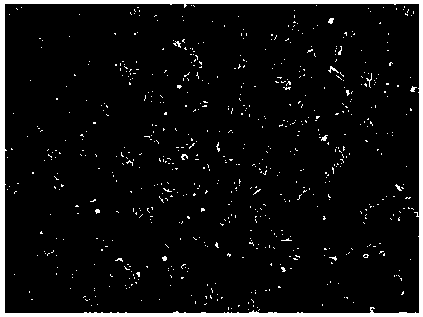Effective method for differentiating from hPSCs to MSCs
A BMP-SMAD1, high-efficiency technology, applied in the field of cell culture, can solve complex and difficult to control problems, and achieve the effect of high reproducibility, simplified steps, and easy operation
- Summary
- Abstract
- Description
- Claims
- Application Information
AI Technical Summary
Problems solved by technology
Method used
Image
Examples
Embodiment 1
[0037] 1) The undifferentiated hPSCs cells ( figure 1 with figure 2 ) Transfer to Matrigel (Matrigel, MG; a kind of extracellular matrix) coated with a 24-well adherent culture plate for 30 minutes, use 0.5ml pluripotent stem cell differentiation medium, 37℃, 5% CO 2 After 24 hours of culture (Day 0), change to 0.5ml pluripotent stem cell differentiation medium without TGF-β1. In addition, the medium also contains 40ng / ml BMP4 and 30ng / mlActivin A, 6μM CHIR99021, 100nMPIK90. Among them, BMP4 is bone morphogenetic protein 4, CHIR99021 is 6-[2-[4-(2,4-dichlorophenyl)-5-(4-methyl-1H-imidazol-2-yl)pyrimidine-2 -Amino]ethylamino]pyridine-3-carbonitrile (CAS: 252917-06-9), Activin A is Activin A, PIK90 is N-(2,3-dihydro-7,8-dimethoxy Imidazo[1,2-C]quinazolin-5-yl)-3-pyridinecarboxamide (CAS: 677338-12-4). Cultivate for 24 hours. Detect the expression of MIXL1, BRACHYURY, HAND1 and other mid-strip markers. It was found that the three middle primitive streak markers were all highly...
Embodiment 2
[0053] Carry out differentiation culture according to the method of Example 1, and make the following improvements: Step 2) Replace with 20ng / ml BMP4 (BMP-SMAD1 / 5 / 8 signal pathway activator), 3uM / ml SB505124 (TGF-β1 / Activin / Nodal- SMAD2 / 3 signaling pathway activator), 1uM / ml Wnt-C59 (Wnt inhibitor) differentiation medium for 24 hours, at this time the lateral mesoderm markers Nkx2.5, HAND1, FOXF1, etc. are highly expressed (Table 4) It can be concluded that the cells are at the stage of lateral mesoderm at this time, and then change to 0.5ml pluripotent stem cell differentiation medium containing 10uM / ml SB431542 without TGF-β1 and continue to culture. The medium is changed every other day without passage. SB505124 is 2-[4-(1,3-benzodiazol-5-yl)-2-(1,1-dimethylethyl)-1H-imidazol-5-yl]-6-methylpyridine (CAS: 694433-59-5), Wnt-C59 is 4-(2-methyl-4-pyridyl)-N-[4-(3-pyridyl)phenyl] benzacetamide (CAS: 12243243 89-1). In step 4), MSCs precursor cells with typical spindle-shaped mo...
Embodiment 3
[0060] Carry out differentiation culture according to the method of Example 1, and make the following improvements: Step 1) After adding basic fibroblast growth factor (bFGF) to the differentiation medium, at step 4) Will get more and more typical MSCs precursor cells with spindle-shaped morphology, such as Figure 5 Shown. The rest of the steps remain unchanged. Finally, after FACS identification, the cells can express CD105, CD90, CD73 and other MSC positive Markers at a high level; they basically do not express CD45, CD34, CD14, CD11b, CD79α, CD19 and HLA-DR and other MSC negative Markers, as shown in the table 6 shown.
[0061] Table 6
[0062]
PUM
 Login to View More
Login to View More Abstract
Description
Claims
Application Information
 Login to View More
Login to View More - R&D
- Intellectual Property
- Life Sciences
- Materials
- Tech Scout
- Unparalleled Data Quality
- Higher Quality Content
- 60% Fewer Hallucinations
Browse by: Latest US Patents, China's latest patents, Technical Efficacy Thesaurus, Application Domain, Technology Topic, Popular Technical Reports.
© 2025 PatSnap. All rights reserved.Legal|Privacy policy|Modern Slavery Act Transparency Statement|Sitemap|About US| Contact US: help@patsnap.com



